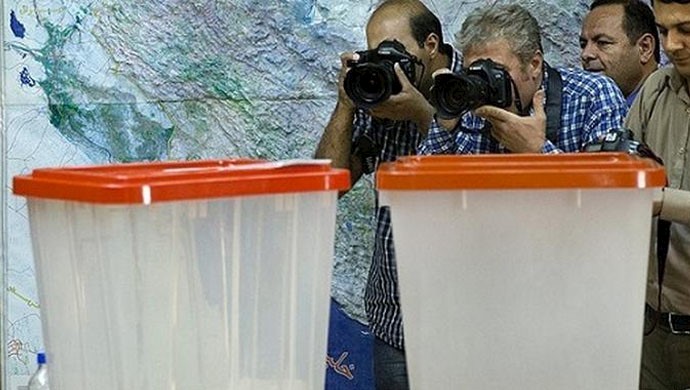Analysis by PMOI/MEK
Iran, February 15, 2020—The upcoming parliamentary elections and the chaos and crises surrounding it continue to remain the main problem of the Iranian regime. The gravity of the situation was reflected in comments made in yesterday’s Friday prayers by the representatives of regime supreme leader Ali Khamenei.
Khamenei’s reps, who are terrified of the consequences of a low voter turnout, begged the public to go to the polls on February 21 and to vote to one of many candidates that have been thoroughly vetted by regime institutions for their loyalty to the rule of the mullahs.
Ahmad Alamalhoda, the Friday prayer leader of Mashhad, clearly laid out the bleak situation for the regime and said, “We’ve put behind 10 rounds of parliamentary elections, but none of them were as dangerous as the 11th Majlis (parliament), nor were they as important.”
Alamahoda further explained the problems the regime faces, saying, “We need a parliament that is powerful and can stand against the world arrogance [Western powers] without fear.”
In Varamin, Tehran province, Hojatollah Esmaili, the Friday prayer leader, said, “Today, supporting the blood of Haj Qassem [Qassem Soleimani] and exacting revenge on the enemy will manifest itself in high participation in the elections. The enemy hopes for a low voter turnout and will consider this a win. Voting is the first duty.”
These remarks echo those of Khamenei, who recently begged the people to vote in the elections. “Some may not like me, but they should vote for the sake of the country’s prestige and security,” Khamenei said, acknowledging that he lacks public support.
The Friday prayer leaders fears also come on the heels of the mullahs’ failure in staging pro-regime rallies on the 41st anniversary of the 1979 revolution, which was celebrated on Tuesday. The speech of regime president Hassan Rouhani was attended by a sparse crowd. In the smaller cities, the crowd that attended the event was even smaller and sometimes didn’t even reach a few hundred people. This is despite the fact that the regime had spent huge resources and rallied the Basij, the military, and government employees to create the semblance of widespread participation.
The regime has been on a downward path since the November uprisings, in which hundreds of thousands of people across more than 190 cities came to the streets and called for regime change. Khamenei only managed to maintain his hold on power by ordering an unprecedented crackdown on the protests, which resulted in the death of more than 1,500 protesters and the arrest and torture of more than 12,000 people. But the brutal repression drove a wedge in the already widening gap between the people and the regime.
Khamenei is faced with a crisis of defection and lowering morale across his own forces and supporters, to the extent that he couldn’t even launch the much-needed propaganda rally on February 11. The infighting in his own ranks is reaching unprecedented levels as the elections close in, and the rivalries are causing Iranian officials to expose previously unknown aspects of the regime’s corruption.
The regime’s main worry now is the widespread boycott of the elections by the people. The mullahs are infamous for their history of “engineering” the results of the elections to their favor. But to do that, they at least need to create the semblance of popular participation in the elections. A low voter turnout will be a huge political blow to the regime.
Sadegh Kharazi, an analyst of the so-called “reformist” camp summed up the situation as such: “Whoever boycotts the elections is not of these people. Whoever boycotts the elections is with the foreign enemies who want to push this establishment toward its destruction. To ensure the political existence and stability of Iran [i.e., the regime], we have no other choice than to bear each other. There’s no second option.”
The truth as, Mrs. Maryam Rajavi, the President-elect of the National Council of Resistance of Iran (NCRI), said in a recent statement, is that the Iranian people have already cast their real vote in the November 2019 and January 2020 uprisings with chants of “death to the principle of the velayat-e faqih, and death to Khamenei.” Boycotting this sham is a patriotic duty and the Iranian nation’s bond with the martyrs, especially the 1,500 massacred during the November 2019 uprising.





